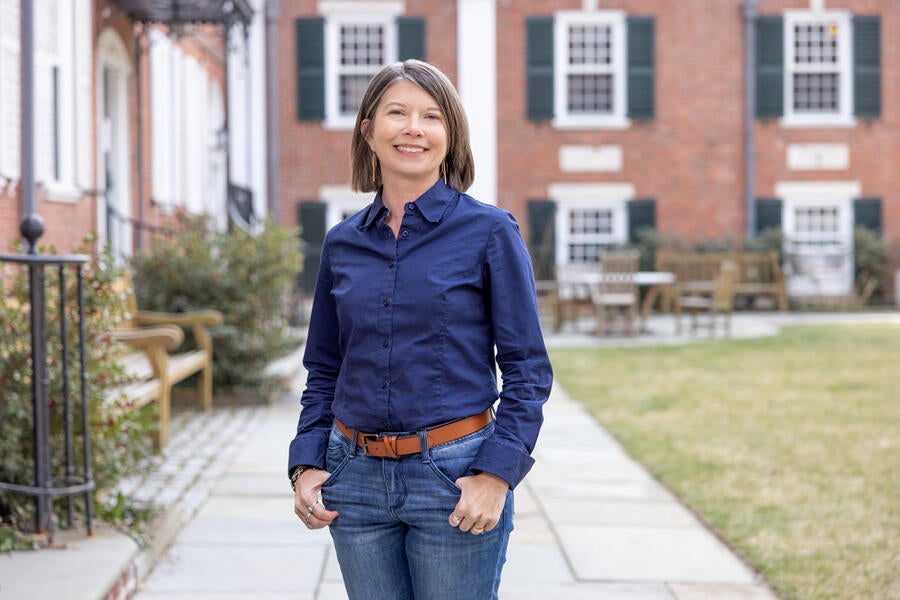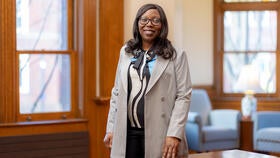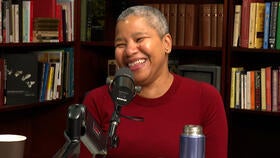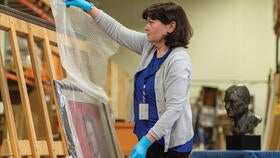
When Shonna Marshall tells people she is a registrar, they usually reply with a single question: what, exactly, does a registrar do? “I get that all the time, whether it’s on campus or outside,” she says.
In answering, Shonna has no shortage of experience to draw from, having spent 14 years working in university registrar offices, the last 10 at Yale. Named to the top job — university registrar — last fall, she and her team directly serve the many record-keeping requirements of Yale College and the Graduate School of Arts & Sciences and help support the registrars of Yale’s constituent schools.
Shonna spoke with YourYale about her “marathon” life as a registrar, the end of the Yale College “shopping period,” and what her work superpower would be. The interview has been lightly edited and condensed.
So what does a registrar do?
The Registrar’s Office keeps the records for the university — what courses were offered, who taught them, the students enrolled in those courses, and what grades they received. We track the students’ progress: Are they earning the requirements needed to get their degree? And we issue transcripts to prove what the students did and to validate their education. So, we’re upholding the integrity of Yale’s degree.
How big is your staff?
We have 21 full-time staff and we’d love to have more. We support a lot of other offices on campus. All the professional schools have a registrar, and we all share the same systems, so we functionally manage about 19 different software systems.
It’s quite a big thing we do, but if we do our jobs well, no one even knows that we exist.
Then we do lots of other things that people don’t think about. We schedule classrooms for departments that don’t have their own rooms or big enough rooms.
Yale must also submit various reports to the government that rely on the student information that we store — such as the students’ enrollment status every month, degrees earned, and time to degree. We support the compliance work of the Financial Aid Office, Office of International Student Services, and Office of Institutional Research, among others.
It’s quite a big thing we do, but if we do our jobs well, no one even knows that we exist.
In 2021, Yale College moved from having a “shopping period,” where undergraduates could sample classes before enrolling in them, to a model of early enrollment and an add/drop period. How did that change come about?
These changes had been discussed for several years, but this time there was enough momentum behind the idea that the faculty approved it. My office worked closely with the Yale College Dean’s office to figure out how to manage this transition. It had a big ripple effect across the whole campus because the students in all the schools cross-enroll so much. Not only did we have to make this big cultural shift and move the enrollment timeline, we also introduced new technology to do all of this. It was a major project. We did it all via Zoom during Covid.
Why switch to pre-enrollment?
It really helps for planning and predictability. For example, in the past, you didn’t really know how many students were going to enroll until the first or second week of classes, and the Graduate School then had to slot all their teaching fellows. We can also start making classroom assignments a lot earlier. We heard from some faculty that when there was a shopping period, it really kept them from launching into teaching as fast.
The new add/drop period allows students to consider any new courses that were developed over the summer, typically by new faculty.
So, when you were 8 years old and wanted to grow up to be a registrar … [Marshall laughs]. Seriously, what drew you to becoming a registrar?
I was a business major. My first job right out of college was working at Missouri State University in the financial aid office. After 11 years I moved over to the registrar side of the house because I wanted to get more into the academic side. And that’s where I’ve found my real enjoyment.
Is there someone or something that had a big impact on your career?
When I was at MSU, a former boss reached out and encouraged me to apply to a position here at Yale. Being from the Midwest, Yale was like Hogwarts — like it wasn’t even real to me. Based on her encouragement, I took a shot. Coming to Yale, moving out here, it changed my life; it changed my children’s lives. That one simple piece of encouragement had such a dramatic impact. I try to carry that forward when I’m working with people, to be that little voice of encouragement.
You were named to the top post of the University Registrar’s Office in September. What are your plans for the future?
I don’t have designs on any big changes. We’re looking at our systems to try to be more efficient in how we get our work done. We’ve had a lot of retirements in our office. I’m trying to do more with less and not stress everyone out. I’m hoping to stabilize everything and make small tweaks, small improvements, and keep slowly making progress.
If you could choose a superpower to help you through your workday, what would it be?
I think the biggest thing for me is endurance. Sometimes you feel like you’re running a marathon, and it’s a marathon made up of mini-sprints. It’s not flying you need; it’s not speed. It really is that: endurance.






